Convocation 2011
Printer Friendly VersionOn May 20, NYU School of Law observed two firsts as it held its 2011 graduation exercises. It was the first time that the ceremonies took place at the historic Beacon Theatre on the Upper West Side, as well as the first year that the J.D. recipients and those earning postgraduate degrees were graduated in consecutive morning and afternoon events. All told, there were eight speeches, two processionals, and 751 graduates who received any of 15 degrees on the same stage where the 2011 Tony Awards were held and the Rolling Stones and Michael Jackson rocked the house.
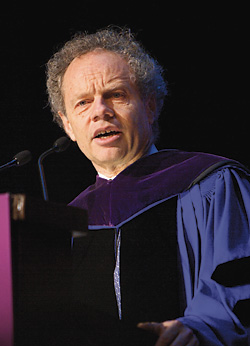 Dean Richard Revesz reflected on the dramatic world events that occurred in recent years, including revolutions in North Africa and the Middle East, the tsunami and its aftereffects in Japan, the BP oil spill in the Gulf of Mexico, and global economic turmoil:
Dean Richard Revesz reflected on the dramatic world events that occurred in recent years, including revolutions in North Africa and the Middle East, the tsunami and its aftereffects in Japan, the BP oil spill in the Gulf of Mexico, and global economic turmoil:
“You’re entering a world of upheaval, but you’re well equipped to handle those challenges.”
Class speaker Noam Biale ’11, a Root-Tilden-Kern Scholar who worked for the Iraqi Refugee Assistance Project in Jordan and for the Equal Justice and Capital Defender Clinic in New York and Alabama, spoke about the need to look at seemingly intractable problems in innovative ways:
“For those of us who came to law school hoping to shine a light on injustice, the world looks increasingly dark, so we will need bold new thinking…. Luckily, NYU has exposed us to people and ideas that continue to challenge the narrative despite the odds.”
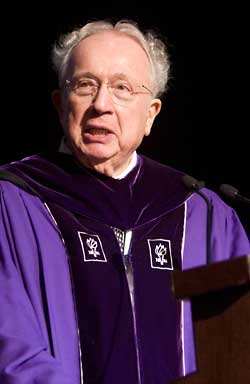 Martin Lipton ’55, chair of New York University’s Board of Trustees and a founding partner of Wachtell, Lipton, Rosen & Katz, described the history of the Law School through the efforts of each of its deans:
Martin Lipton ’55, chair of New York University’s Board of Trustees and a founding partner of Wachtell, Lipton, Rosen & Katz, described the history of the Law School through the efforts of each of its deans:
“Go forth in the tradition that Arthur Vanderbilt described, combining the professional practice of law with public service.”
Francis Chukwu (LL.M. ’11), who graduated first in his class from the University of Nigeria Faculty of Law, recalled co-founding Afritude, a student discussion forum about history, news, and events shaping Africa:
“From the day we had our first session to the day we had our last, I never ceased to be amazed at the interest and empathy shown by participants, about 80 percent of whom were non- Africans, in the history, the cause of justice, human rights, development, democracy, and responsible governance in Africa. My faith that we could help nurture one another’s dreams to succeed has only waxed stronger. I believe that this strong sense of support and encouragement for one another will, in no small measure, define our success.”
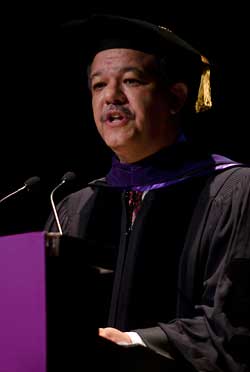 Leonel Fernández, president of the Dominican Republic, who is known for his extensive reform efforts in his home country, cited the rapidly changing global landscape, encompassing the world economy, the environment, democratization, and the need to give emerging countries a more prominent place at the table:
Leonel Fernández, president of the Dominican Republic, who is known for his extensive reform efforts in his home country, cited the rapidly changing global landscape, encompassing the world economy, the environment, democratization, and the need to give emerging countries a more prominent place at the table:
“At this moment in history, mankind is at a crossroads. For the pessimists, we are approaching doomsday. For others like us, however,we have never doubted the creative capacity of the human race. This is an exhilarating and challenging period which must result in a new wave of prosperity, social justice, development, and transformation.”
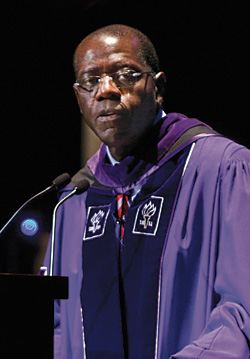 Anthony Welters ’77, chairman of the Law School’s Board of Trustees, recounted the story of one of the Law School’s first African- American graduates, Charles Conley ’55, who played an integral role in the civil rights movement and was the first African-American judge elected in Alabama:
Anthony Welters ’77, chairman of the Law School’s Board of Trustees, recounted the story of one of the Law School’s first African- American graduates, Charles Conley ’55, who played an integral role in the civil rights movement and was the first African-American judge elected in Alabama:
“You are living proof that America’s best days are ahead of it.”
—
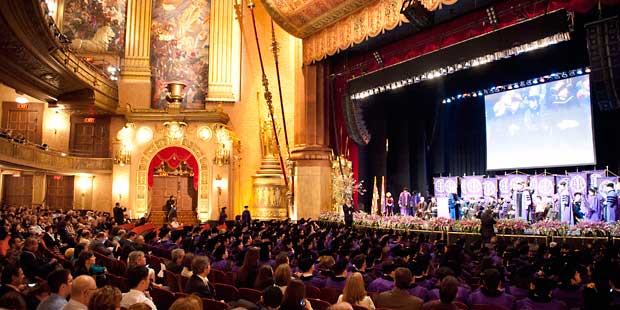

 Multimedia
Multimedia